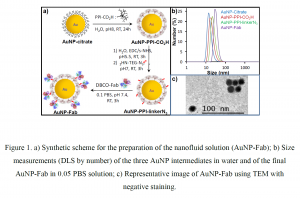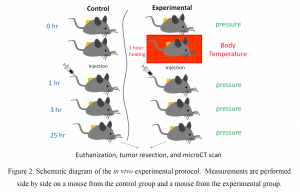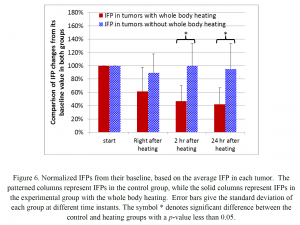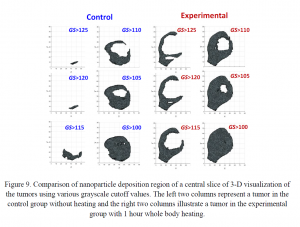In this study, we performed in vivo experiments on mice to evaluate whether whole body hyperthermia enhances nanoparticle delivery to PC3 (prostatic cancer) tumors. PC3 xenograft tumors in immunodeficient mice were used in this study. The mice in the experimental group were subjected to whole body hyperthermia by maintaining their body temperatures at 39-40ºC for one hour. Interstitial fluid pressure (IFP) was measured before heating, immediately after, and at 2 and 24 hours post-heating in tumors in both the experimental group and in a sham group (without heating). 0.2 cc of a newly developed nanofluid containing gold nanoparticles (AuNPs) was delivered i.v. via the tail vein in both groups. MicroCT scanned images of resected tumors in both groups were analyzed to visualize nanoparticle distribution in the tumors and to quantify the total amount of the nanoparticles delivered to the tumors. The results showed a 39% decrease in the IFP of PC3 tumors after 1-hour whole body hyperthermia treatment. There was a statistically significant reduction of 50% 2 hours post heating and a 58% reduction 24 hours post heating. Analyses of microCT scans of the resected tumors illustrated that nanoparticles were more concentrated near the tumor periphery rather than the tumor center. The 1-hour whole body hyperthermia treatment resulted in more nanoparticles present in the tumor central region than that in the control group. The mass index calculated from the microCT scan suggested overall 42% more nanoparticle delivery in the experimental group than that in the control group. 1-hour mild whole body hyperthermia leads to sustained reduction in tumoral IFPs and significantly increases the total amount of targeted gold nanoparticle deposition in PC3 tumors. It suggests that mild whole body hyperthermia is a promising approach for enhancing targeted drug delivery to tumors.



